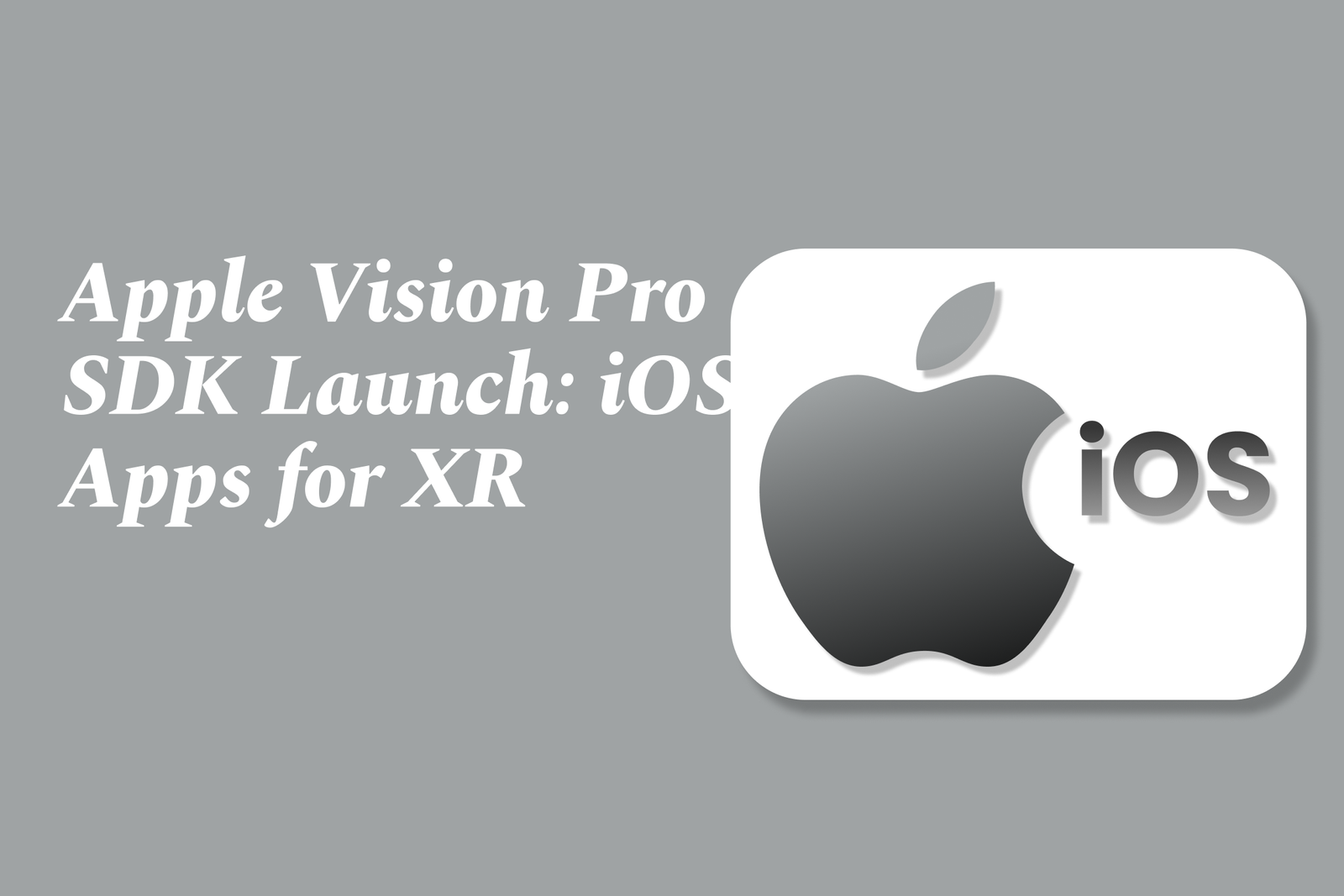Apple Vision Pro SDK Launch: iOS Apps for XR
Apple Vision Pro SDK enables developers to bring iOS apps into the XR space by adapting them for visionOS, Apple’s new spatial computing platform. It supports seamless app transition and new immersive experiences, expanding iOS apps into the next generation of mixed reality.
Apple Vision Pro SDK Launch: iOS Apps for XR
1 ) Overview of Apple Vision Pro SDK and App Store
Apple Vision Pro introduces a brand new App Store dedicated to visionOS, the spatial computing platform for the Vision Pro headset.
Both newly developed visionOS apps and compatible iOS/iPadOS apps can be submitted and discovered through this App Store.
Most existing iPhone and iPad apps run unmodified on the Vision Pro, automatically appearing in the Vision Pro App Store without additional developer work.
Developers can manage availability and metadata through App Store Connect.
2 ) Preparing and Developing Apps for visionOS
Developers can use the latest Xcode with the visionOS SDK to build new spatial computing experiences that leverage Vision Pro’s immersive capabilities.
Updating existing projects for visionOS typically requires changing project settings and recompiling, allowing the app UI to adopt visionOS’s native system appearance.
Extensive design and development resources are available to help achieve platform specific features and immersive experiences tailored for Vision Pro.
3 ) Testing and Compatibility
It is crucial to test apps on actual Vision Pro devices or Simulator to ensure proper functionality and user experience.
Compatibility checks help developers identify if their existing apps can run seamlessly or need modifications for optimal spatial computing use.
4 ) Community and Development Challenges: Unreal Engine Support
Developers are actively discussing Unreal Engine integration, noting experimental support for iOS Simulator and challenges in enabling Vision Pro SDK compatibility.
Some developers report errors related to VisionOS platform support in Unreal Engine 5.4 and efforts to overcome these issues are ongoing.
The community is optimistic but recognizes the current early stage complexities in smoothly transitioning projects to Vision Pro.
5 ) Market Potential and Industry Applications
Apple Vision Pro is positioned not just for entertainment but as a powerful business and productivity spatial computing device.
With immersive user interfaces familiar from Apple products and lightweight design, it enhances accessibility and comfort for users.
The device’s use cases span multiple sectors including retail, healthcare, education, gaming, sports, and event management.
Integration with AI is expected to deliver highly personalized, engaging virtual experiences enhancing brand interaction and user satisfaction.
6 ) Key Takeaways
Apple Vision Pro sets a new standard in spatial computing with innovative hardware and user experience.
Early adoption phase means the developer ecosystem is still maturing, with substantial growth potential.
Leveraging existing iOS apps and converting them for visionOS provides a straightforward entry point for developers.
The combination of immersive engagement, multi industry utility, and AI integration marks Apple Vision Pro as a transformative tool for brands and developers in XR.
https://justacademy.in/news-detail/new-android-widgets-trends
https://justacademy.in/news-detail/flutter-theme-extensions-in-latest-version
https://justacademy.in/news-detail/flutter-for-embedded-systems-2025
https://justacademy.in/news-detail/cross-platform-apps:-react-native-leading-the-pack
https://justacademy.in/news-detail/why-react-native-developers-are-making-20%-more-in-2025
Related Posts
Java supports GDPR and data privacy by enabling secure data handling through encryption, controlled access, and precise data management. It allows developers to minimize PII exposure, ensure data confidentiality, and design workflows that comply with data protection regulations effectively.
Java code quality tools have evolved to include advanced static analysis, integrated security checks, and AI-powered code reviews. These updates help developers detect bugs, enforce coding standards, and enhance security, streamlining the development process and improving overall code reliability.
Java remains a cornerstone in big tech companies, evolving with modern features like records, pattern matching, and virtual threads. Its robust ecosystem, enhanced performance, and growing AI integrations keep it vital for both legacy systems and innovative new projects.
Java and CI/CD pipeline optimizations streamline Java application development by automating builds, tests, and deployments. They improve efficiency through parallelization, caching, and secure secrets management, enabling faster feedback loops and more reliable, scalable software delivery.
Java supports modern cryptography standards through its flexible Java Cryptography Architecture (JCA), enabling integration of advanced algorithms like AES, EdDSA, and post-quantum tools. Libraries like Bouncy Castle offer FIPS-certified, hardware-accelerated implementations for secure development.
Java 23 enhances record patterns by enabling concise, direct destructuring of record components within pattern matching, simplifying type checks and data extraction. This improvement boosts code readability and expressiveness by reducing boilerplate in handling immutable data classes.
Java remains a top choice for mobile app backends, powering scalable, secure, and high-performance server-side solutions. Latest trends include cloud-native microservices, reactive programming, and enhanced JVM optimizations, enabling efficient, flexible, and robust mobile backend development.
Java SE 24 and LTS Java SE 21 offer enhanced features and performance, while Apache Spark 4.0.0 introduces Scala 2.13 support and advanced ML and SQL capabilities. Together, they empower developers to build scalable, high-performance data applications with modern tools.
JUnit 5 modernizes Java testing with a modular architecture, improved assertions, and seamless Java 8+ support. Beyond JUnit, tools like Mockito and AssertJ enhance mocking and assertions, creating a powerful, flexible ecosystem for writing clean, efficient Java unit tests.
Java plays a pivotal role in cloud automation tools by providing a robust, platform-independent language used to build scalable automation frameworks like Jenkins and Selenium, enabling efficient CI/CD pipelines, testing, and orchestration across diverse cloud environments.










